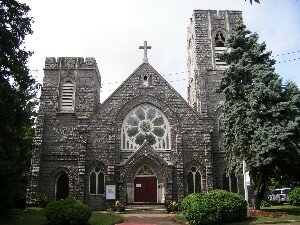NEWS- Bishop beef: Episcopalian rift over new leader
If religion and politics are two subjects verboten at the dinner table, diners might be well advised to avoid the topic of Katharine Jefferts Schori while passing the salt and pepper. Jefferts Schori is the newly elected Presiding Bishop of the Episcopal Church, and as first woman to hold that national post, she finds herself at the center of a heated political debate that's become particularly hot in Central Virginia.
Jefferts Schori's gender is not the problem; it's her stand on homosexuality. Asked recently by CNN if she believed homosexuality is a sin, she said, "I don't believe so. I believe that God creates us with different gifts.
"Some people come into this world with affections toward other people of the same gender," she added, "and some people come into this world with affections directed at people of the other gender." Thus her vote three years ago to approve the first openly gay bishop in 450 years of Anglican history, New Hampshire's Gene Robinson.
Opinions on Jefferts Schori's stance vary at Charlottesville-area Episcopal churches. "It's more pro than con, and no one is neutral," says the Rev. Julie Norton, rector of Grace Episcopal Church in Keswick.
"It's mixed," says the Rev. Brian Vander Wel, associate rector of downtown's Christ Episcopal Church, which lost some of its congregation for opposing consecration of gay bishops based, he says, on "principle and Biblical authority."
That stand is marked by concern over how Jefferts Schori will affect the Episcopal Church– an American body– and its place in the worldwide Anglican Communion. Vander Wel says the new bishop is out of step with the Anglican Communion's governing body in England that in 2004 asked the Episcopal Church to express regret for consecrating Bishop Robinson and to place a moratorium on approving any more gay bishops.
"This is a fatal blow in the Anglican Communion if the Episcopal Church does not comply," says Vander Wel. "The Anglican Communion will cease to be as it exists."
The man in charge of ameliorating those worries is Virginia Diocesan Bishop Peter Lee. As Virginia's representative at the tri-annual Episcopal convention that elected Jefferts Schori, he was also part of the body that levied a moratorium on consecrating any more bishops "whose manner of life is a challenge to the wider church."
Asked to clarify that language, Lee says, "I think by expanding the concept it takes away the focus on gay and lesbian people, but that's the context of it."
In spite of Jefferts Schori's support for the more vaguely worded measure, some of her area supporters are not happy with the resolution. "It's gay bashing," says Grace Episcopal parishioner Barclay Rives, "trying to be framed in delicate and evasive language."
Vander Wel, however, says the resolution does not go far enough– because there are no built-in consequences for violating it. "The Episcopal Church is an undisciplined church," he says. "I have a little boy, and it'd be like saying don't throw food off your tray; and he throws food off his tray, and I don't do anything about it. There have to be consequences."
But the Diocese of Newark now has a metaphorical handful of Cheerios cocked and ready to test mother church. Just last week, on June 28, it nominated an openly gay priest as one of four candidates to be its next bishop.
That same day, the Dioceses of Pittsburgh, South Carolina, and San Joaquin, California– all members of a dissenting group of dioceses called the Anglican Communion Network– petitioned the Archbishop of Canterbury to appoint a separate leader for them.
The controversy has spurred talk of some individual churches breaking with the Episcopal Church altogether. "I've heard talk like that," says Grace Episcopal's Norton. "We're not splitting."
Would Christ Episcopal? Vander Wel would not comment. He does, however, say that Christ Episcopal's leadership has discussed joining the dissenting dioceses in the ACN– a group that some speculate may one day supplant the Episcopal Church as America's representative in England.
"I can't speak for Jeffrey [Fishwick, Christ Episcopal's rector, who is on sabbatical], but the rest of the clergy think it's a good idea," says Vander Wel. "We'd be publicly putting our flag down and saying, 'This is where we stand.'"
Vander Wel is hopeful, however, that churches like his can ultimately remain Episcopal. "The Archbishop sees the need for provision in the Episcopal Church for those who disagree with the direction they're taking but want to remain in the Anglican Communion," he says.
In spite of the divergent views, Virginia's Bishop Lee says the church has emerged more unified from this year's convention. "There have been public statements from the extreme right and left that they're opposed to [Jefferts Schori's election]," he says, "but the vital center is affirmed."
The clergy of Charlottesville's Christ Episcopal Church is at odds with its new national leader over homosexuality.
PHOTO BY LINDSAY BARNES
#
